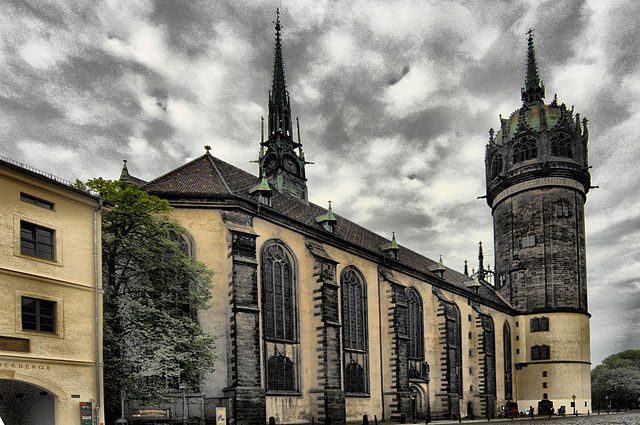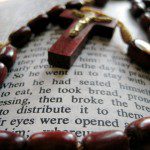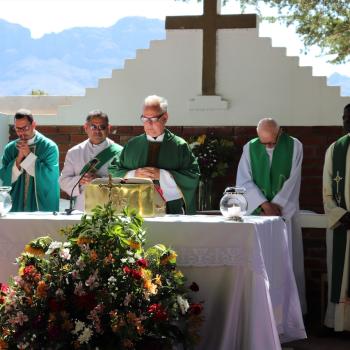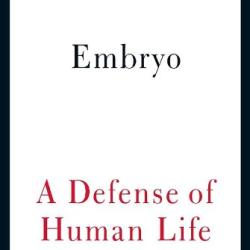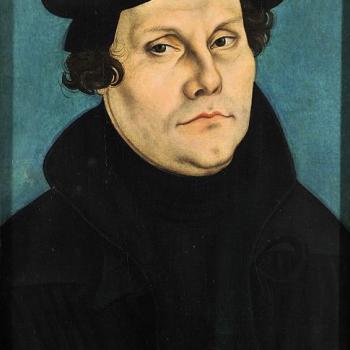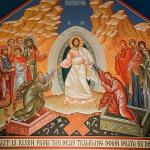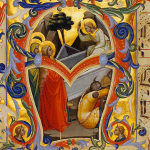All Saints’ Church, Wittenberg, Germany (built bet. 1490-1511), where Luther nailed his 95 Theses to the door [Wikimedia Commons / Creative Commons Attribution-Share Alike 3.0 Unported license]
***
(1-27-12)
***
From Bishop Bossuet, The History of the Variations of the Protestant Churches, Vol. 1 (New York: John Doyle, 1842), pp. 193-197; further primary source information can be found by following the link for the book. A few minor variations of proper names were added, in order to adopt more standard usage.
Although Luther permitted Melanchthon to say whatever he pleased against the Mass, yet he in nowise departed from his former notions, nor did he reduce the presence of Jesus Christ in the Eucharist to the bare reception of it. It is even plain that Melanchthon shifted with him on this subject; and there are two of Luther’s letters, in 1543, wherein he commends a saying of Melanchthon’s, “that the presence was in the action of the Supper, but not in a precise and mathematical point.” As for Luther, he determined the time to be from the Pater Noster which was said in the Lutheran Mass immediately after the Consecration, until all the people had communicated, and all the remaining particles were consumed.
But why stops he there? If, at that instant, the communion had been carried to the absent, as St. Justin tells us was done in his time, what reason would there have been to say, that Jesus Christ had immediately withdrawn his sacred presence? But why should he not continue it for some days after, when the Holy Sacrament should be reserved for the communion of the sick? It is nothing but mere caprice to take away the presence of Jesus Christ in this case; and Luther and the Lutherans had no longer any rule, when, out of the actual reception, they admitted the use of it but for never so short a time.
But what made still more against them is, that the Mass and Oblation always remained; and, had there been but one moment of presence before the communion, this presence of Jesus Christ could not be deprived of any of the advantages which attended it. For which reason Melanchthon always aimed, whatever he might say to Luther, at placing the presence in the precise time of the reception alone, and this only way could he find of destroying the Oblation and Mass.
Nor was there any other way for destroying the Elevation and Adoration. It has been shown that, at taking away the Elevation, Luther, so far from condemning it, approved the principle of it. I repeat once more his words:—”The Elevation,” he says, “may be preserved, as a testimonial of the real and corporal presence; since the doing that is saying to the people, Behold, Christians, this is the body of Jesus Christ, which was given for you.” This was what Luther wrote after abolishing the Elevation; but why, then, one may say, did he abolish it?
The reason is worthy of the man; and we learn from himself, “that if he attacked the Elevation, it was only out of spite to the Papacy; and, if he retained it so long, it was out of spite to Carlstadt. In a word,” concludes he, “it should be retained when it was rejected as impious, and it should be rejected when commanded as necessary.” But, upon the whole, he acknowledged what, indeed, is not to be doubted—that there could be no difficulty in showing to the people this divine body from the very time it began to be present.
As to the Adoration, after having one while held it as indifferent, and another laid it down as necessary, he at length adhered to his last conclusion; and in the positions which he published against the Doctors of Louvain in 1545, that is, a year before his death, he called the Eucharist “the adorable sacrament.” The Sacramentarian party, who had so much triumphed when he set aside the Elevation, was in a consternation; and Calvin wrote, “that, by this decision, he had raised up the idol in God’s temple.”
Melanchthon was then more than ever convinced that it was impossible to destroy the Adoration, or the Mass, without reducing the whole Real Presence to the precise moment of the manducation. He saw, even, that it was necessary to go further, and that all the points of Catholic doctrine relating to the Eucharist returned upon them one alter another, if they did not find out a way to separate the body and blood from the bread and wine. He then pushed the principle already spoken of so far as that nothing was done for the bread and wine, but all for man: insomuch, that in man only was the body and blood to be really found.
[see Facebook post, “Melanchthon’s Silly Argument for a Temporary Real Presence“]
Melanchthon has never explained in what manner he would have this to be done: but as to the foundation of this doctrine, he never left off insinuating it with great secrecy, and in the most artful manner he was able: for there were no hopes, as long as Luther lived, of making him relent on this point, nor of being able to speak freely what men thought: but Melanchthon so deeply rooted this doctrine in the minds of the Wittenberg and Leipzig divines, that, after Luther and he were dead, they plainly explained themselves in favor of it in an Assembly, which, by the Elector’s orders, they held at Dresden, in 1561.
There they feared not to reject Luther’s proper doctrine, and the Real Presence which he admitted in the bread; and finding no other means of defending themselves against Transubstantiation, the Adoration, and Sacrifice, they went over to the Real Presence taught them by Melanchthon; not in the bread and wine, but in the faithful who received them.
They declared, therefore, “That the true substantial body was truly and substantially given in the Supper, although there was no necessity of saying that the bread was the essential body or the proper body of Jesus Christ, or that it was corporally and carnally taken by die corporeal mouth; that ubiquity raised a horror in them; that it was a subject of astonishment that men should be so positive in affirming that the body was present in the bread, since it was of much more importance to consider what is done in man, for whom, and not for the bread, Jesus Christ rendered himself present.”
After that they explained their sentiments concerning the Adoration, and maintained that it could not be denied, admitting the Real Presence in the bread, although it should even be explained that the body is not present in it except in the actual use: “That the Monks would always have the same reason for beseeching the eternal Father to hear them through his Son, whom they rendered present in this action; that the Supper having been instituted for the remembrance of Jesus Christ, as he could not be taken nor remembered without believing in, and calling on him, the addressing one’s self to him in the Supper as present, and as placing himself in the hands of sacrificing priests after the words of Consecration, could by no means be hindered.”
By the same reason they maintained that, admitting this Real Presence of the body in the bread, the sacrifice could not be rejected, and they proved it by this example: “It was,” said they, ” the ancient custom of all suppliants, to take in their arms the children of those whose assistance they implored, and present them to their fathers, in order to prevail with them by their interposition.”
They said, in the same manner, that having Jesus Christ present in the bread and wine of the Supper, nothing could hinder us from presenting him to his Father, in order to render him propitious to us; and, lastly, they concluded “that it would be much more easy for the monks to establish their Transubstantiation, than for those to impugn it, who, rejecting it in word, affirmed, nevertheless, that the bread was the essential body, that is, the proper body of Jesus Christ.”
Luther had said at Smalkald, and made the whole party subscribe to it, that the bread was the true body of our Lord equally received by saints and sinners: he himself had said, in his last “Confession of Faith,” approved by the whole party, ” that the bread of the Eucharist is the true natural body of our Lord.” Melanchthon and all Saxony had received this doctrine with all the rest, for Luther would be obeyed: but, after his death, they fell off from it, and owned with us, that these words, “the bread is the true body,” import necessarily the change of bread into the body; since, it being impossible for the bread to be the body by nature, it could not become so but by a change; thus they openly rejected their master’s doctrine.
But they went much further in the above declaration, and confess that, admitting, as Lutherans had hitherto done, the Real Presence in the bread, there could be no objection to the sacrifice, which Catholics offer to God, nor to the adoration they pay to Jesus Christ in the Eucharist.


